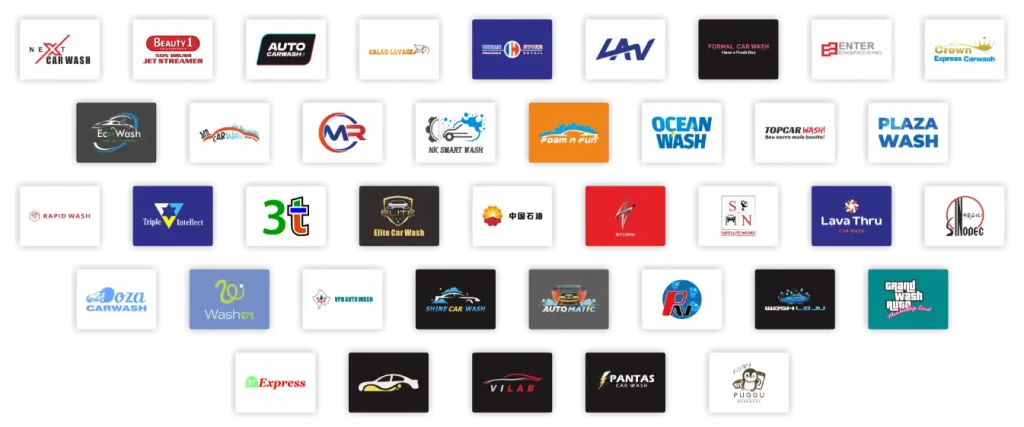Automatic car cleaning machines have revolutionized the way we clean our vehicles. With advanced technology, these systems offer a variety of washing options that cater to different needs and preferences.
In this article, we’ll explore the two main types of automated washes: in-bay automatics and tunnel car washes, and we’ll dive into a comparative analysis of friction versus touchless washing methods.
In-bay automated car washes are stationary systems where the vehicle remains in one spot while the wash equipment moves around it. This setup is ideal for smaller spaces and provides a thorough cleaning experience. With options for soft cloth or high-pressure rinse, in-bay automatics cater to various cleaning needs without the hassle of driving through.

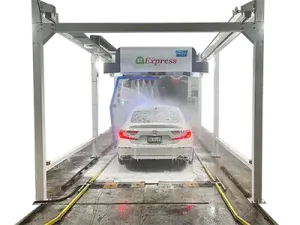
Tunnel car washes are designed for speed and efficiency. Vehicles move through a long conveyor belt where a series of cleaning stations apply bulk car wash soap, water, and drying agents. This type of wash is great for customers in a hurry, as it typically completes the cleaning process in under 10 minutes. Tunnel washes often feature advanced technologies that ensure a high-quality clean.

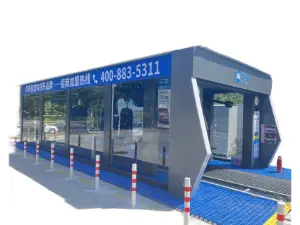
When choosing an automatic wash, understanding the difference between friction and touchless systems is essential.
Friction car washes use soft cloths or brushes to scrub the vehicle’s surface. These systems are effective at removing dirt and grime but may raise concerns about potential scratching. However, modern friction washes use gentle materials designed to protect the vehicle’s finish.

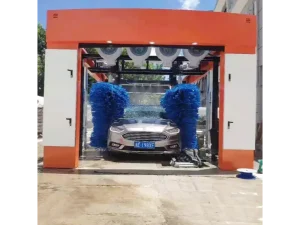
Touchless car washes, on the other hand, utilize high-pressure water jets and cleaning solutions to clean the vehicle without any physical contact. This method reduces the risk of scratches and is ideal for delicate finishes. Touchless systems can be particularly effective at removing tough stains and dirt.
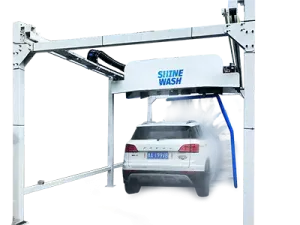
One of the most significant advantages of automatic washes is the consistent quality they deliver. With set processes and professional-grade equipment, you can expect a reliable clean every time.
Automated washes provide versatility to accommodate different vehicles and cleaning needs. From sedans to SUVs, these systems can be customized to offer a range of services, including car wash sealer wax and undercarriage cleaning.
The impact of car wash automatic on your vehicle largely depends on the type of wash you choose and how well the equipment is maintained. While many modern automatic washes are designed to be safe and effective, there are some concerns to consider. Friction washes, which use brushes or cloths, can potentially cause minor scratches if the materials are not properly maintained or if debris is caught in the wash. Touchless washes, which rely on high-pressure water and cleaning solutions, generally pose a lower risk to your car’s paint but may not be as effective at removing heavy dirt or grime.

Yes, it can potentially damage paint, but this risk varies by type of wash. Friction car washes can cause swirl marks or scratches, especially if they use worn brushes or abrasive materials. On the other hand, touchless car washes minimize this risk as they do not physically touch the vehicle’s surface. However, it’s essential to ensure that the wash uses high-quality cleaning agents and is well-maintained. Regular car wash sealer wax can also help protect your vehicle’s paint from any potential harm caused by washing.

The cost of an automated car wash machine can vary widely based on several factors, including the type of system, features, and brand. Generally, basic in-bay automatic machines start at around $30,000, while more advanced tunnel car wash systems can range from $30,000 to over $60,000. Additional costs may include installation, maintenance, and operational expenses, such as water and car wash supplies. Investing in a high-quality machine can provide a good return by attracting customers and ensuring efficient service.

Want to get a detailed plan? Contact Shinewash experts now!
When it comes to keeping your vehicle clean, you might find yourself debating between an auto car wash and a hand wash. Each method has its pros and cons, and understanding these differences can help you make an informed decision.
Car Automatic Wash:
In an automated car wash, your vehicle goes through a mechanical system designed to clean it quickly and efficiently. These systems utilize various tools, including brushes, high-pressure water jets, and specialized cleaning solutions. The process is streamlined and often requires minimal involvement from the vehicle owner.

Hand Wash:
A hand wash is a manual cleaning process where trained personnel or car owners wash the vehicle using sponges, buckets, and specific cleaning products. This method allows for greater flexibility in choosing the products used and provides a more customized approach to the cleaning process.
Automatic Car Cleaning Machine:
Automated washes are known for their speed and efficiency. A typical wash can be completed in under 10 minutes, making them ideal for busy individuals who need a quick cleaning solution.
| Item | Wash Time/Speed |
| Rollover Car Wash Machimes | 2.5-5min/Car |
| Tunnel Car Wash Machines | 60-100 Cars/Hour |
| Touchless Car Wash Machines | 2.5-5min/Car |
Hand Wash:
While hand washes can take longer, they allow for a thorough cleaning experience. Depending on the size of the vehicle and the level of detail desired, a hand wash may take anywhere from 30 minutes to an hour.
Car Automatic Wash:
It’s effective but may lack the precision that a hand wash offers. Some hard-to-reach areas might not receive the same level of attention as they would with a manual wash.
Hand Wash:
A hand wash excels in precision and attention to detail. Experienced workers can pay close attention to intricate parts of the vehicle, ensuring a comprehensive clean, including wheels, door jams, and undercarriages.
Automatic Car Wash:
While modern automatic washes are designed with vehicle safety in mind, friction washes may still pose a risk of minor scratches if brushes are not maintained properly. Touchless washes reduce this risk but may not remove all grime effectively.
Hand Wash:
When done correctly, a hand wash is generally safer for the vehicle’s paint. Careful techniques and the use of microfiber cloths can minimize the risk of scratching or damaging the finish.
Automatic Car Cleaning Machine:
The cost of an automated car wash can range from $10 to $30, depending on the services offered. This makes it a budget-friendly option for regular maintenance.
Hand Wash:
Hand washes typically cost more, ranging from $20 to $50 or more, depending on the level of detailing requested. However, this investment can be worthwhile for those seeking a thorough clean.
Automatic Car Wash:
Many automated car washes utilize advanced water recycling machine that can recycle up to 70-80% of the water used during each wash cycle. This dramatically reduces overall water consumption, using as little as 15-30 gallons of water per vehicle compared to the 80-100 gallons typically required by traditional hand washing. By recycling water, these systems minimize waste and conserve valuable resources, making automatic car cleaning machine a more environmentally friendly option.

Hand Wash:
Hand washing a vehicle at home can lead to significant water waste if not done carefully. However, using a bucket and sponge can minimize this impact.

Determine Which Type of Automated Car Wash
Before heading to the car wash, know whether you’re using an in-bay automatic wash or a tunnel wash. In-bay systems allow your vehicle to remain stationary while the equipment moves around it, whereas tunnel washes involve driving your vehicle through a series of cleaning stations. Understanding the differences can help set your expectations for the wash.
Adjust Your Car’s Driver-Assistance Features
Many modern vehicles come equipped with driver-assistance features, such as lane-keeping assist and adaptive cruise control. Before entering the car wash, it’s a good idea to disable these features to prevent any unintended actions while the vehicle is in the wash.
Ensure the Vehicle’s Windows Are Rolled Up
One of the simplest but most crucial steps is to ensure all windows are fully closed before entering the wash. This prevents water from getting inside your car and protects your interior from potential damage.
Find Out If the Wash Uses Brushes or Is Touchless
Different car washes employ different cleaning methods. Brush washes use soft cloths or brushes, while touchless washes rely solely on high-pressure water and cleaning solutions. Knowing what type of wash you’re using can help you anticipate how your car will be cleaned and whether any potential for scratches exists.
Consider Paying for a Hand-Wash Experience
Some automatic car washes offer an option for a hand wash, which can provide a more detailed clean without the risks associated with machines. If you have concerns about scratches or dirt buildup, this could be worth the extra cost.
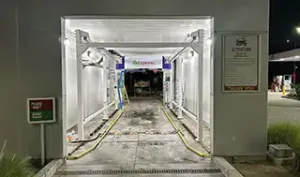
Follow the Instructions: Each car automatic wash has specific instructions displayed on signage. Be sure to read and follow them carefully to avoid confusion or accidents.
Align Your Vehicle Properly: When entering the wash, align your vehicle with the guide rails to ensure it moves smoothly through the system.
Stay in Neutral: Once your car is in the wash, shift into neutral and let the automatic system take over. Avoid accelerating or braking until the wash is complete.
Keep Hands on the Wheel: While in the wash, it’s good practice to keep your hands on the wheel to maintain control, especially in tunnel washes where the car is in motion.
Be Patient: The wash process usually takes only a few minutes, but it’s important to stay patient and wait until the wash is finished before driving away. Rushing can lead to mishaps or accidents.

If your vehicle has an automatic start-stop feature, ensure that you don’t brake while entering the wash. The system is designed to disengage when the car is in motion, so maintaining a steady speed will prevent any unexpected stops or movements that could cause damage.
If your vehicle is equipped with a rain sensor, it’s wise to deactivate it before entering the wash. The sensor might mistakenly trigger the wipers during the wash process, potentially causing unnecessary wear or damage to the wiper blades or windshield.
Parking sensors can become confused in the confined spaces of a car wash. Deactivating them will prevent false alarms and help you avoid any abrupt responses that could lead to bumps or scrapes against the wash equipment.
Aerial: If your vehicle has an aerial or antenna, consider removing it or folding it down if possible. Automatic car cleaning machine can snag or damage them during the wash process.
Side Mirrors: If your side mirrors are adjustable, fold them in before entering the wash. This will help prevent them from being hit by the washing equipment.
Windscreen Wipers: Ensure that your windscreen wipers are in the correct position before entering. Some car washes have a pre-wash that can activate the wipers, potentially causing them to wear out.
The process usually begins with high-pressure water jets that spray the vehicle to remove loose dirt and debris. This initial rinse prepares the surface for the main wash, ensuring that grime is loosened and ready to be removed.
In this stage, the vehicle is subjected to various scrubbing and brushing methods. Depending on the type of wash, this may involve soft cloths or brushes that gently scrub the surface to remove tougher stains. High-quality bulk car wash soaps and detergents are used to break down grime effectively while protecting the paint.
After the scrubbing phase, the car is rinsed thoroughly to wash away car wash soap and remaining dirt. Following the rinse, many automatic car washes utilize high-powered blowers or drying systems to remove excess water, minimizing the risk of water spots.
Some automatic equipments for car wash offer additional detailing services, such as car wash sealer wax, tire cleaning, or spot-free rinses, which provide extra protection and shine to your vehicle. These services can enhance the overall cleanliness and appearance of your car.
Many automated car washes offer undercarriage cleaning as part of their services, especially in tunnel washes. This feature typically involves high-pressure water jets that spray the underside of the vehicle to remove dirt, salt, and debris that can accumulate. However, not all automatic equipments for car wash include this option, so it’s essential to check beforehand if undercarriage cleaning is available. If you frequently drive in areas with road salt or heavy dirt, seeking out a wash that includes this service can help protect your vehicle from corrosion and rust.
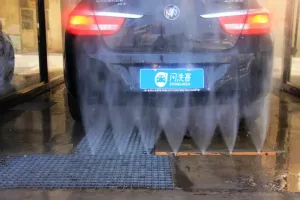
The duration can vary depending on the type of wash and the services included. Generally, most automatic carwashes take between 5 to 15 minutes to complete. In-bay automatics may take a bit longer, especially if they include additional services like car wash sealer wax or drying. Tunnel washes are typically quicker due to their streamlined processes. Regardless of the type, the efficiency of car wash automatic makes them a convenient option for busy car owners.
| Item | Wash Time/Speed |
| Rollover Car Wash Machimes | 2.5-5min/Car |
| Tunnel Car Wash Machines | 60-100 Cars/Hour |
| Touchless Car Wash Machines | 2.5-5min/Car |
Investing in a car wash automatic can be a lucrative business decision for several reasons:
One of the advantages of an auto car wash business is its scalability. Once established, owners can easily expand operations by adding more machines, opening new locations, or diversifying service offerings. This scalability can lead to increased revenue streams and a stronger market presence.

Choosing the right location is critical for the success of your car wash automatic. Look for areas with high traffic, visibility, and accessibility. Proximity to residential neighborhoods, shopping centers, or busy roadways can attract more customers. Consider zoning regulations and competition in the area to ensure you’re entering a viable market.
Investing in high-quality equipment is essential for providing excellent service. Research different types of automatic car wash systems, such as in-bay automatics or tunnel washes, and assess your budget. Consider factors like durability, maintenance costs, and available features. It’s also wise to consult with industry experts or suppliers to find the best equipment for your needs.
While auto car washes require less manpower than hand washes, you will still need staff to manage operations, assist customers, and maintain equipment. Hire individuals who are reliable and customer-oriented. Providing training on equipment operation, safety protocols, and customer service will help ensure a smooth operation.
Effective marketing is crucial to attract customers to your new car wash. Develop a marketing strategy that includes both online and offline efforts. Utilize social media platforms, create a website, and consider local advertising. Offering promotions or loyalty programs can also encourage repeat business. Collaborating with local businesses or community events can enhance your visibility and reputation.
Today’s consumers are increasingly concerned about environmental impact. To appeal to eco-conscious customers, consider implementing environmentally friendly practices in your car wash business.
Choose biodegradable and environmentally safe cleaning products that effectively clean vehicles without harming the environment. Highlighting your use of eco-friendly car wash chemicals can attract environmentally conscious customers and improve your brand image.
Implementing a water recycling machine can significantly reduce water waste and lower operational costs. These systems recycle water used in the washing process, allowing you to conserve resources while maintaining cleanliness. Not only does this practice benefit the environment, but it can also enhance your business’s sustainability credentials.

Still don’t know how to start a car wash business? Contact Shinewash experts now!
Consulting with industry experts can provide insights into optimizing your workflow, reducing wait times, and improving customer satisfaction. They can help you identify bottlenecks and implement strategies to enhance efficiency.
Experts can guide you in selecting the right equipment based on your business model and budget. They can also advise on maintenance practices to keep your equipment in top shape, ensuring consistent service quality.
Professionals can assist in developing effective marketing campaigns tailored to your target audience. They can help you leverage social media, SEO, and local advertising to attract more customers and build your brand.
Investing in employee training is essential for delivering excellent service. Experts can provide training programs that focus on customer service, equipment operation, and safety protocols, helping your staff perform at their best.

For entrepreneurs, the automatic car wash business presents significant opportunities due to high demand, profitability, and scalability. By carefully selecting a location, investing in quality equipment, and implementing effective marketing strategies, business owners can create a successful enterprise. Additionally, incorporating eco-friendly practices and technologies can enhance your brand’s reputation and attract environmentally conscious customers.
Whether you’re a car owner looking for the best washing method or an aspiring business owner eager to enter the industry, this comprehensive guide provides the essential insights needed to navigate the automated car wash landscape. By leveraging expert advice and focusing on quality service, you can ensure that both your vehicle and business thrive in this competitive market.
